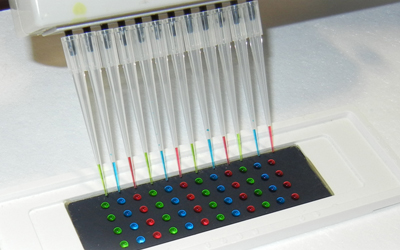A research team led by Professor Jackie Y. Ying from the Institute of Bioengineering and Nanotechnology (IBN) has devised a miniaturized biological assay or biochip dubbed as the Droplet Array technology to explore the impact of anti-cancer medicines on cancer stem cells (CSCs).
 BN’s patented Droplet Array technology
BN’s patented Droplet Array technology
Since CSCs accounts for roughly 1% of total cancer cells, It is difficult to investigate them using traditional drug screening techniques, which are slow and costly and need large volumes of samples. On the other hand, the Droplet Array requires only limited samples and performs faster and simpler drug screening at a lower cost, thus paving the way to develop high-efficiency anti-cancer drugs.
The Droplet Array is a rectangular, flat glass plate comprising a sequence of 2-mm-dia spots. The samples to be analyzed are pipetted into the small spots. A layer of proprietary oil is then coated over the plate for preventing evaporation and the sample droplets from getting cross contaminated during the automated rinsing process. An integrated bench-top device developed by the team automates the rinsing process. Each spot in the Droplet Array has a size one-fifth of that of a well in a typical microplate and needs just 500 cells for drug screening, making them suitable to study CSCs at a lower cost.
The research team tested the Droplet Array to analyze the drug efficacy on CSCs extracted from colon, liver and breast cancer cells. What the team discovered was chemotherapeutic drugs like doxorubicin showed poor efficacy on these CSCs. In animal studies, the team demonstrated the self-renewal property of the CSCs that drives the metastasis.
Ying informed that the development of the Droplet Array is a major achievement in lab-on-a-chip and nanotechnology concepts. The team believes that the Droplet Array may support or substitute animal models for studying drug toxicity and help in developing novel cancer diagnostics. Curiox Biosystems, a spinoff of IBN, is currently commercializing the Droplet Array technology under the trademark DropArray.
Source: http://www.ibn.a-star.edu.sg